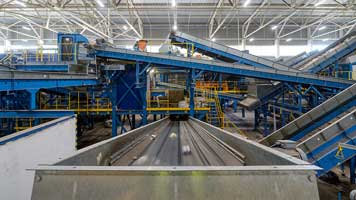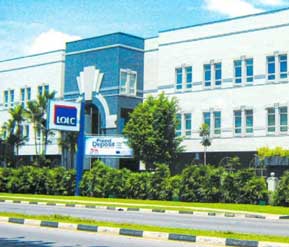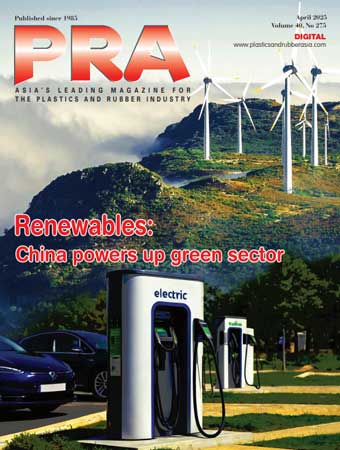Recycling: Plastic Back/Vinyl Institute/Freepoint to pilot PVC recycling process; LOLC/Corsair partner for recycling facility in Sri Lanka

US-based trade association Vinyl Institute (VI) is supporting Israeli start-up Plastic Back in its launch of what it says is a “first-of-its-kind” pilot project aiming to enhance PVC recycling rates and showcase that PVC can be efficiently transformed into valuable raw materials and reintegrated into industrial supply chains. The project, to be commissioned in Q1 2026 at a Freepoint Eco-Systems’ facility in Hebron, Ohio, will test and scale a chemical recycling technology developed by Plastic Back.
The pilot will be hosted at Freepoint Eco-Systems' large-scale plastic upcycling facility, which is capable of processing up to 90,000 tonnes/year of waste.
Supported in part through funding from the VI’s Viability grant program and the Bird Energy program managed by the US-Israel Bird Foundation, the pilot will process PVC-rich waste streams and serve as a collaborative platform, bringing together waste handlers, petrochemical companies, brand owners, and technology providers to demonstrate a scalable circular solution for PVC.
This pilot comes at a critical moment, as regulators and industry stakeholders around the world face mounting pressure to address plastic waste and accelerate circular solutions. In the US Extended Producer Responsibility (EPR) programs and federal policy proposals are advancing mandates for increased recycling rates across all major plastic categories. At the same time, the vinyl industry has committed to ambitious circularity goals, including targets to grow post-consumer recycling of PVC to 160 million pounds of PVC by the end of 2025. Demonstrating that PVC can be chemically recycled at scale is essential for meeting both regulatory expectations and long-term voluntary ESG commitments across the value chain.
Plastic Back is expanding its presence in the US through this project, building on research from the Hebrew University of Jerusalem, Plastic Back has developed a proprietary low-temperature chemical recycling process that safely dechlorinates and depolymerises PVC. The result is said to be high-quality oil-based feedstocks and mineral residues that can re-enter the chemical supply chain, without generating hazardous emissions or relying on energy-intensive processes.
PVC is one of the world’s most widely used polymers, found in everything from construction materials and medical equipment to cables and consumer goods. Despite its versatility and durability, PVC has historically been primarily recycled mechanically and excluded from chemical recycling efforts due to its chlorine content. These challenges have limited recovery options.
Plastic Back process is uniquely capable of unlocking dual value from end-of-life PVC:
- It dechlorinates the polymer, converting its chlorine content into a purified sodium chloride (brine) solution, which can be reused in the chlor-alkali process, a core input for new PVC production.
- It depolymerises the carbon backbone into hydrocarbon oils, analogous to naphtha, suitable for use in steam crackers and refineries, creating direct value for the broader petrochemical sector.
The pilot will demonstrate the commercial scalability of Plastic Back’s technology and test various PVC-containing waste streams identified by the project.
Plastic Back is executing the pilot with Freepoint Eco-Systems, an affiliate of Freepoint Commodities. Freepoint Eco-Systems develops and operates facilities that convert post-use plastics into usable products.
In other news, LOLC Advanced Technologies (LOLC AT), a fully owned subsidiary of LOLC Holdings PLC, together with Amsterdam-based recycler Corsair Group International are in a partnership to upgrade and expand LOLC AT’s existing waste-to-fuel plant at Kerawalapitiya, Sri Lanka.

This initiative aims to address Sri Lanka’s growing plastic and polyethylene (PE) waste challenge. With Sri Lanka generating an estimated 7,000 tonnes/day of solid waste, equating to roughly 2.56 million tonnes/year, a significant portion of which consists of PE, plastic pollution has become one of the country’s most pressing environmental concerns.
LOLC AT invested in and commissioned a waste-to-fuel plant in 2023, which it has successfully operated throughout 2024. This facility converts non-recyclable plastics into a reusable fuel, offering a viable alternative to fossil fuels while diverting waste from landfill and incineration.
The newly formed partnership with Corsair will build upon this foundation, introducing enhancements to increase processing capacity and improve efficiency. Through proprietary technology developed in-house by Corsair together with its technology partners, the project will focus on producing ISCC Plus-certified pyrolysis oil.
The new facility will have the capacity to process 12 million kg/year of plastic waste, and will be able to handle larger volumes of plastic waste and process a broader range of material types.
Construction of the facility is scheduled to commence in 2025, with completion expected within approximately two years. Under the partnership, Corsair will bring in its technical expertise and global experience in plastic waste recycling, while LOLC AT will leverage its operational capabilities.
(PRA)SUBSCRIBE to Get the Latest Updates from PRA Click Here»











